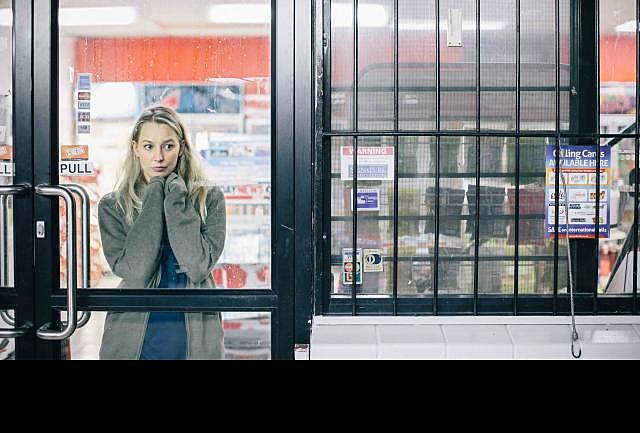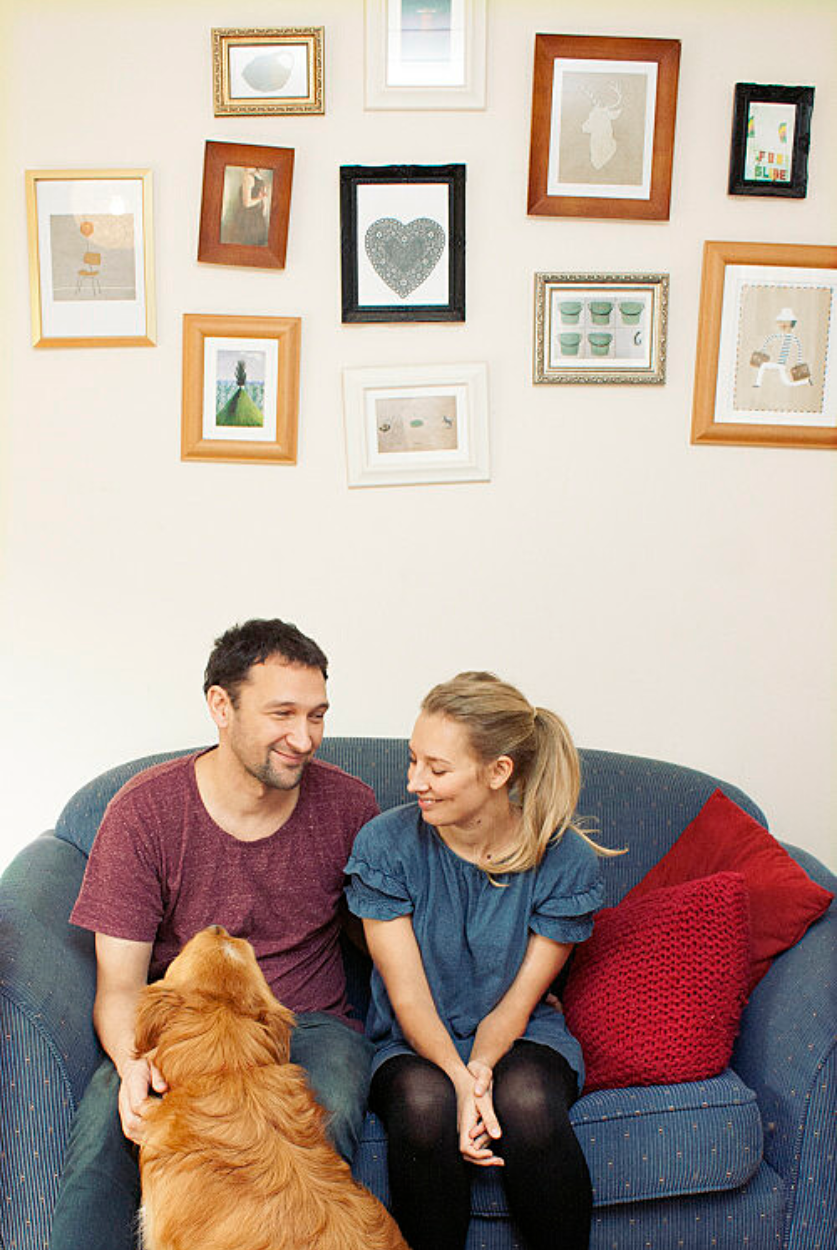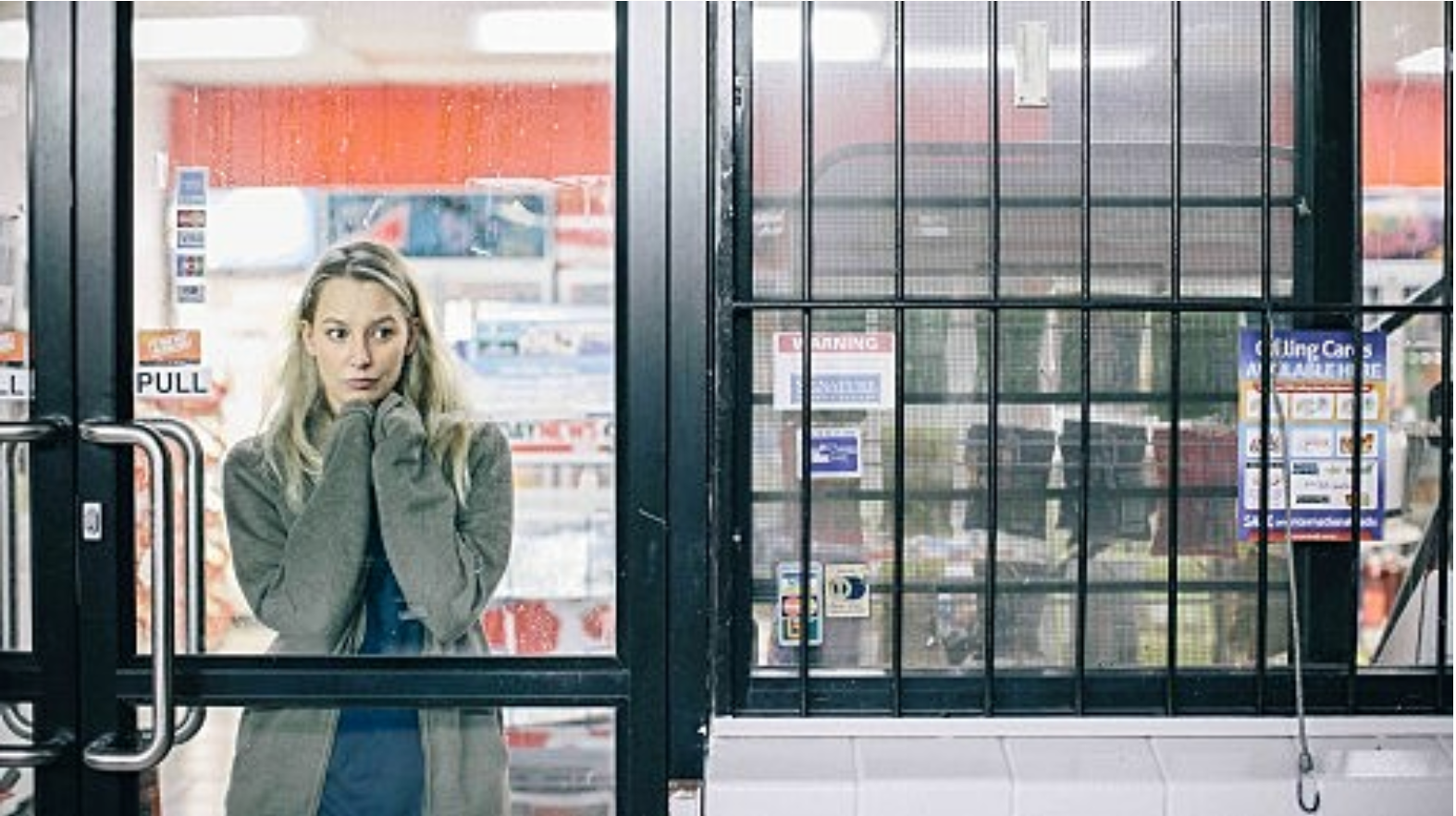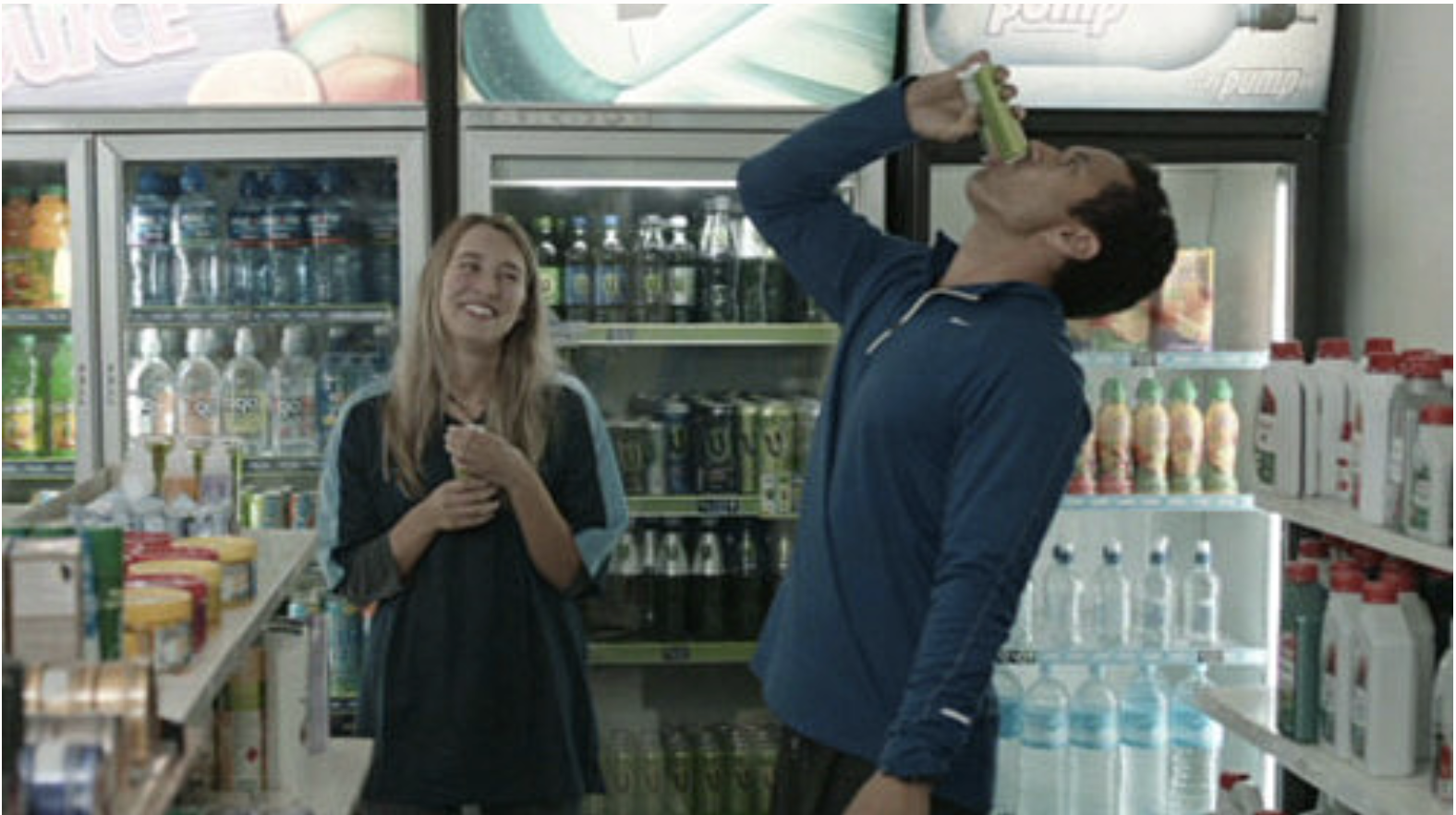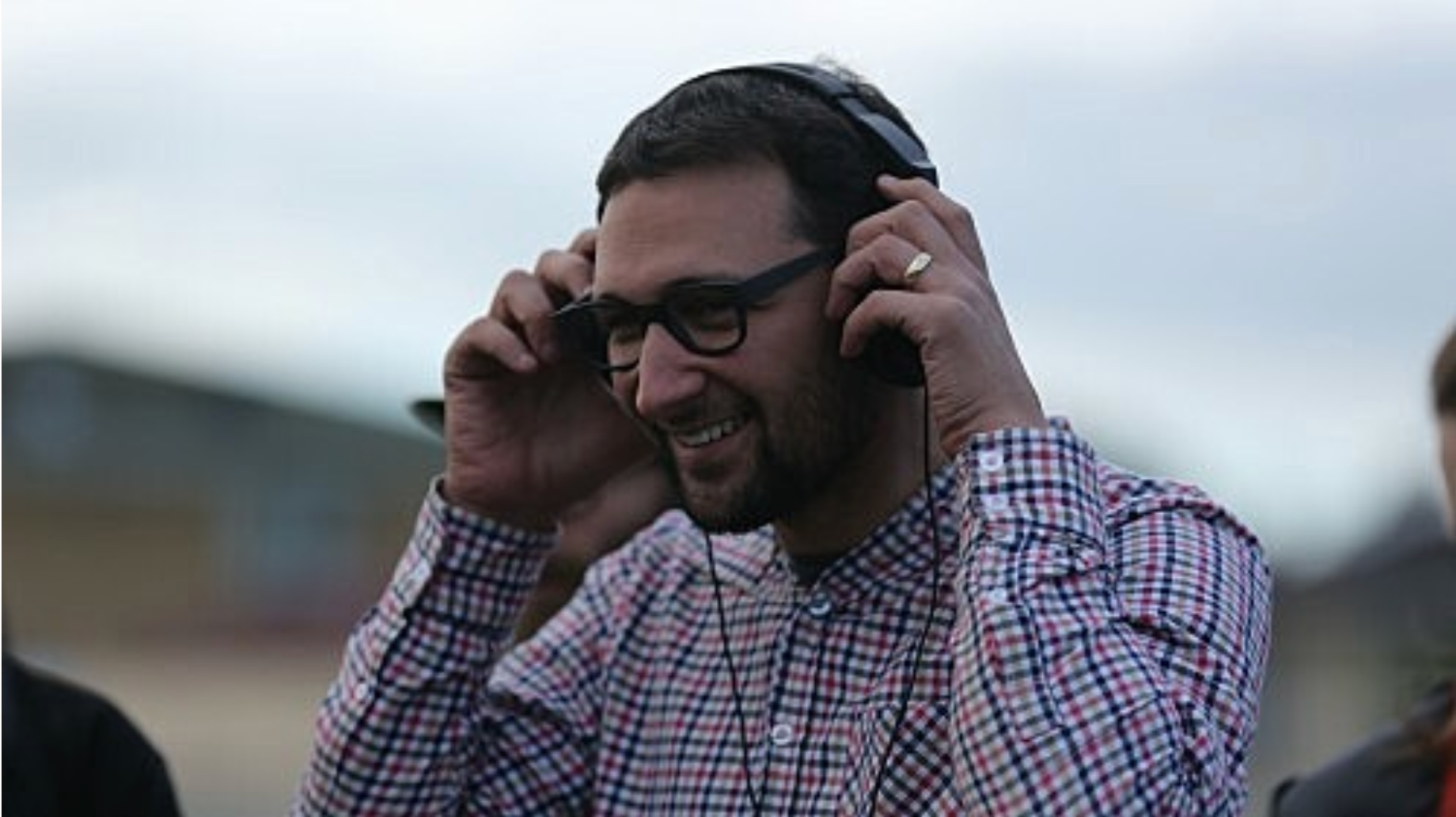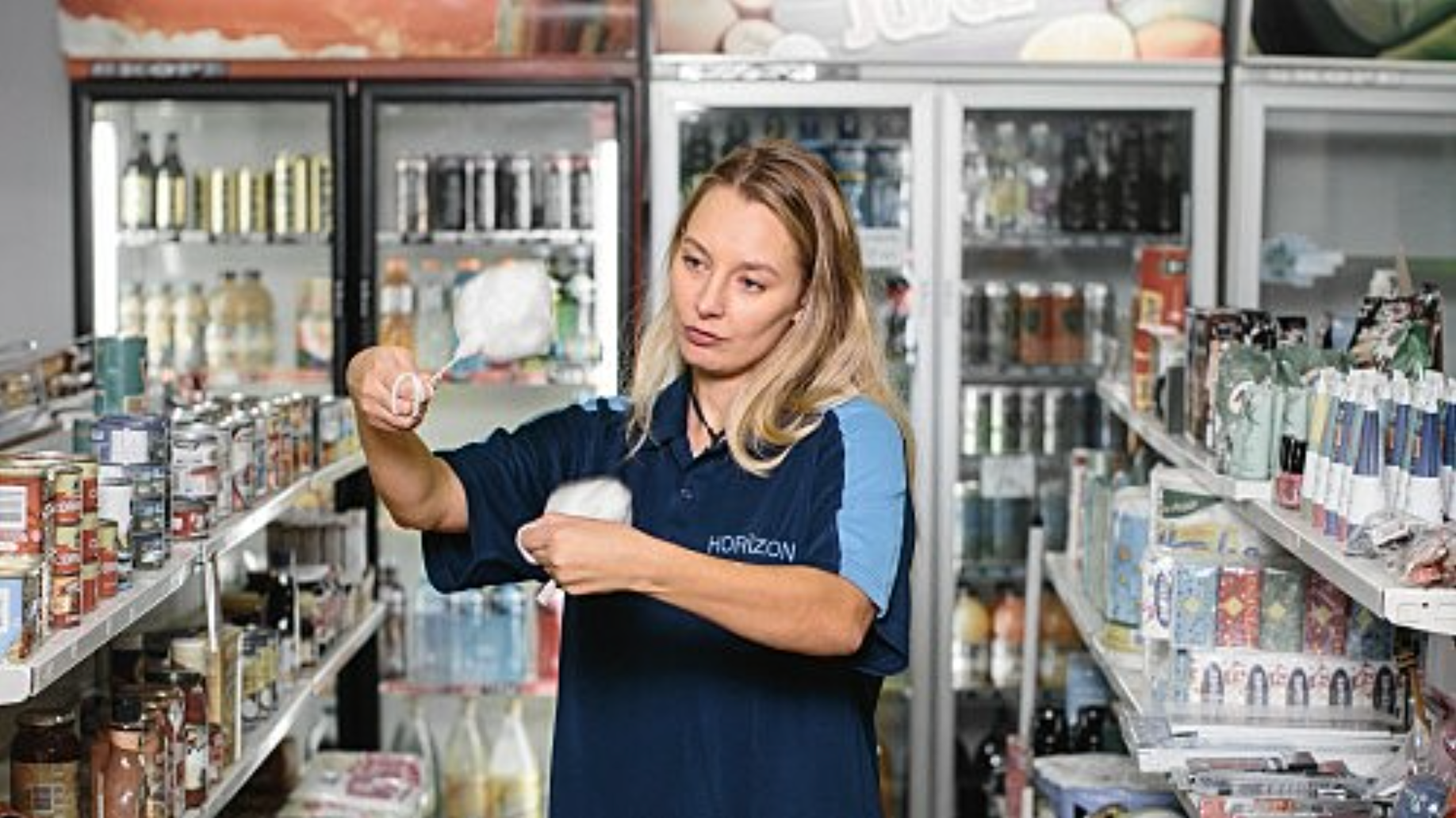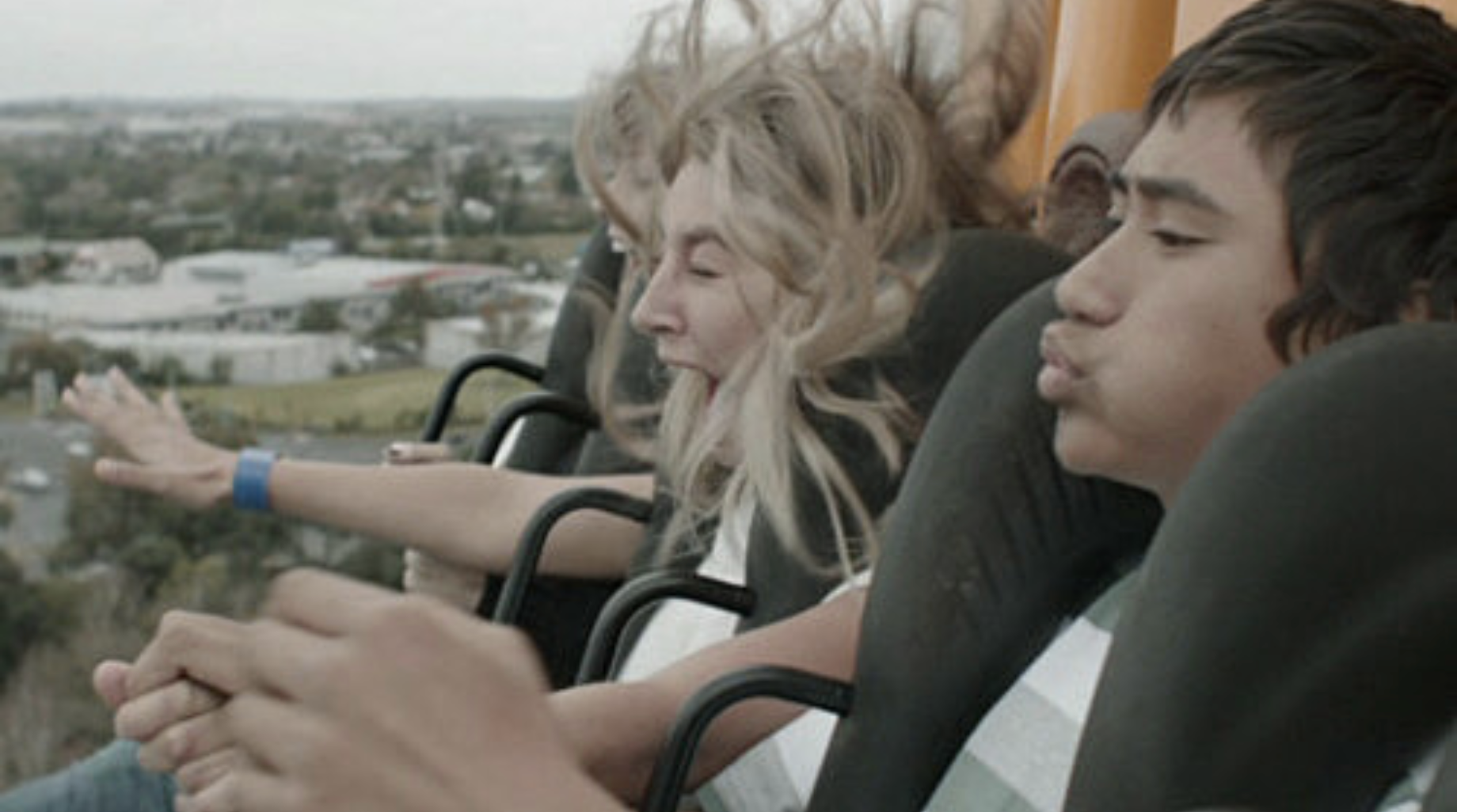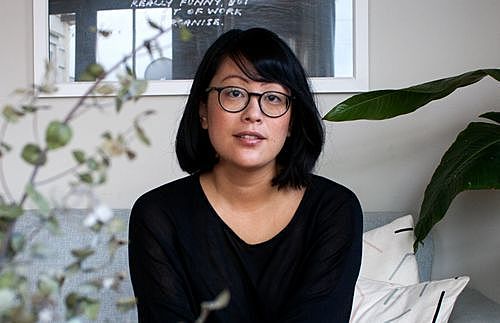The Making of Fantail: Sophie Henderson and Curtis Vowell in Conversation
Ahead of their debut film Fantail premiering at the New Zealand International Film Festival, Sophie Henderson and Curtis Vowell talk about the experience of making it, the shift from theatre, and the discovery of family secrets.
Here's how you learn to make your first feature film: You let it become your life. You read books on screenwriting. You read screenplays. You watch director's commentaries, like American Beauty's, or P. T. Anderson's, or David Michôd's, who did Animal Kingdom. You go to every Script to Screen. You talk to everyone you can. You make mistakes. You learn. You keep learning.
Shot over 20 days, Fantail is the debut feature film of husband-wife team Sophie Henderson (writer, actor) and Curtis Vowell (director). “It’s about a Pakeha girl who thinks she’s Maori,” says Curtis. “She spends her nights working at the petrol station, saving all her money so she can take her brother to Surfer’s Paradise to find their dad.”
It’s a film that feels difficult to summarise, because doing so cloaks some of its central essence. It's like describing Boy as a film about an eleven year-old kid who's been abandoned by his dad. It is, but it isn't. Fantail's a film about family, sacrifice and mistakes. It's also a film that's charming and funny and unnervingly dark. There's a quality to the writing that takes you by surprise: that highlights the beauty and ugliness of life in ways you don't expect, casting them in a flickering, fluorescent kind of light.
Ahead of its world premiere at the New Zealand International Film Festival, the three of us sat down to talk about the film, the shift from theatre, and the discovery of family secrets.
Curtis
It's the first film we've worked together on. It's the first film either of us have done.
Sophie
Ever.
Curtis
Full stop.
I've worked on films, but always as an assistant director, and a lot of my work has been in the commercial world.
Rosabel
How have you found the whole process?
Curtis
Obviously incredible. You know, we made a few mistakes, but that was all part of the [New Zealand Film Commission's] Escalator experience – having the freedom to do that – and I'd do it again in a heartbeat. Although, there were definitely times when, in the middle of it, we were like, 'Oh, this is just awful.’ We had lots of logistical problems with things not quite working out, but that's the benefit of having it in the low-budget format - it forces you to try other ways to get it done and make it work.
The petrol station itself was - early on in the script, in the development period, we were going, 'How do we get the petrol station?' and at one stage we were talking about building it from scratch in a studio -
Sophie
So that we could have it during the day and night -
Curtis
Yeah, so we could have total control of it - but then we did a rough budget and it just blew out and -
Sophie
Everyone was like, 'You'll never get a petrol station - none of those petrol stations will ever let you film there. We've tried and we've tried to do it with this and we've got money' -
Curtis
And so Sophie and I went around to almost every petrol station and -
Sophie:
We decided that those GAS ones were -
Curtis:
They were independently owned so basically if we could sweet talk the owner, then we'd be able to get in there, but even then it was a long shot. Eventually we pulled up to this one petrol station out in Penrose and built up some courage and we went in and went up to the owner and said, you know, this is who we are, can we shoot in here, and he was totally like, 'Yup, away you go.' and if you've seen the film, it's just an amazing petrol station. We couldn't have asked for a better world. It's not pretty, you know, it's kind of a bit run-down, which is exactly how we wanted it to look.
Imagine if we had gone down that studio route.
Sophie
It'd be terrible! It would have been so horrible.
Curtis
It would have lost all that authenticity and dirtiness.
Rosabel
When you pitched to the service station owner, did you tell him the story as well?
Sophie
Nup.
Curtis:
We did and we didn't.
Sophie
We didn't tell him the ending.
Curtis
We didn't tell him that - you know - yeah, the ending. But in saying that, I guess if we had told him, he was such a nice guy that he would've still said: You know what? Okay.
Rosabel
The police came to shut you down a few times though, didn’t they?
Curtis
(laughing) How did you know about that?
Sophie
It was quite a rough area we were in, so the police were quite often in the neighbourhood -
Curtis
And they drove past lots. They drove past all the time. Why did they keep coming? Because it was a dodgy neighbourhood.
Sophie
Because it was unusual that people were in there. The time they shut us down was because we had a low loader, which is like a trailer you put a car on so you can do driving scenes.
Curtis
It sits just off the ground and it gets pulled, so you put the car on the back and it looks like you're just driving along.
Sophie
And we had permits for this one road, but we had to drive through this other road to get to this road and so they shut us down -
Curtis
On the way from A to B. We weren't allowed to get there. But there was no way to get there.
We did have people hanging off the side of the car with harnesses and cameras. It looked pretty dodgy.
Sophie
That was the first day of shooting that we got shut down.
Curtis
That was the second shot. We got one wide looking into the car, and then -
Sophie
It was pretty bad.
Curtis
It was a disaster of a first day.
Sophie
And it was your birthday.
Curtis
It was my birthday, and I was like: Man, I hope this whole experience isn't going to be like this. But that was probably the worst thing that happened to us.
Sophie
Yeah.
Curtis
Though there were definitely other bumps along the way -
Sophie
There was a whole lot of problem solving.
Curtis
Everyday was like: take away what you want to do and replace it with what you can do, which is never as good but then you just try and make it work.
Sophie
It’s become our life. This is maybe all we've talked about for two years (laughs). We cannot have a conversation without talking about it, so it was like that when I was writing it, it was like that in pre-production, it was like that during shooting. We would drive there together, go home again. I don't know what we're going to do when it's out. I don't know what we're going to talk about.
Curtis
It'll be finished. It'll be finished in ten days.
Sophie
We've just sort of just lived and breathed it. And it's been great because we have this shorthand and can easily tell each other that 'that idea's shit,' or -
Curtis
Yeah and we did [the play] I Heart Camping together, which was like a tester. It has overpowered our lives. But in a good way, because you don't have to call someone up and say, 'Oh, I've got this idea, let's have a meeting and try to remember everything.' It'll be like, three in the morning and one of us will say, 'What if - what if we made this more obvious?'
Rosabel
How have you found find the shift from theatre to screen? What've been the biggest differences?
Sophie
Just that you want to tell a story through showing it rather than hearing it. You want to reveal character through action, rather than dialogue.
Rosabel
Though in a lot of ways, you could say the same about theatre -
Curtis
You could, but you can't quite see the same kind of close-up facial expression onstage. So you can't take the whole audience and go: here's a close-up and here's her thinking 'I really want to get out of this petrol station.' So in theatre you almost need to say that.
It's quite subtle, and it would be easy to say, 'All you do is reduce the dialogue' but it's not - it's just allowing the pictures to tell the story, more than you can onstage.
Rosabel
Right, and that's tied to the fact that a camera allows intimacy, and direction of gaze - you're being told where to look, whereas with theatre, you've got the whole scene in front of you.
Curtis
Exactly.
Sophie
It's like a wide shot -
Curtis
It's like a constant wide where you can focus on whatever you want, but you possibly miss key things. I guess in theatre it's your job through lighting and staging to pull into focus what you want as a director, whereas in film you can say, 'I want a 50mm lens on a close-up and look sad as your brother goes to Papamoa.'
Sophie
(laughs) Is that how you direct?
Curtis
(laughing) 'Look sad. Just be sad.'
Sophie
'Be angry.'
Curtis
'And... cry.'
Rosabel
How was it directing a film, compared to theatre?
Curtis
It's entirely different, from my experience.
Sophie
We didn't rehearse much, did we?
Curtis
You don't have as much time, in one sense, for the performance side, whereas with theatre because it's just the actors onstage every night, you get that whole rehearsal period to really explore.
With Fantail, you had to find someone who was that character, and cast them based on that, knowing that they'd be able to bring it. Because you have to bring it. You get two or three takes, and that's it.
Sophie
Sometimes in film there's not a focus on the acting and performance and that's what Curtis really brought to directing. It became all about the acting. You can get really distracted by all the technical aspects.
Curtis
It can take a backseat, and some directors really focus on making it look beautiful and having really cool visual effects - which is amazing and is something I don't understand too well. I knew my strength was knowing what was good and what wasn't, performance-wise, so that's what I kept trying to work on, and I knew that I could do that.
Rosabel
And did you shoot it chronologically?
Sophie
Nah we didn't. That was the plan, because it was all in one place, so we were like, surely we can shoot in all in one -
Curtis
And that's how it started but then it became, well - all the location stuff we decided to shoot right at the start, and then, you know, just logistics - Jared was only available for a week so we had to pull all his stuff together, and it became part-chronological but part-character blocks.
Sophie
The second day was that scene where i had to cry on the bus. That was like day 2 -
Curtis
Because it was a location shot -
Sophie
- I was so angry. I was like 'What DO YOU MEAN.'
Curtis
'Just imagine you've shot [the previous scene] and you can feel it.' No, but that's the skill of a screen actor. That's what you have to be able to do. Sorry but that's just -
Sophie
You wouldn't usually have to do that.
Curtis
Well, absolutely you would.
Sophie
Maybe. Maybe not day 2.
Curtis:
I mean it's unfortunate that it was day 2, but equally if it's required you have to -
Sophie
Yeah that's true -
Curtis
And you went there and did the job.
Rosabel
And you did it really well.
Curtis
You did. And it cuts together.
I mean in a dream world, from an actor's point of view, of course: shoot it chronologically. And, you know, there are fantastic movies that do do that -
Sophie
A Beautiful Mind is shot chronologically -
Curtis
But you've also got to have a lot more money. So that's one thing that doesn't lend itself towards low budget film-making.
Rosabel
Did you ever think about making Fantail as a play?
Sophie
Yeah. Totally. In fact, I applied for some funding and didn't get it.
Rosabel
Is that basically what guided that decision?
Sophie
Definitely. It was for three grand or something. To develop it.
Curtis
It was three thousand dollars from Arts Alive. And they had funded us for I Heart Camping. And we thought, oh, we'll be able to get funding for Fantail.
Sophie
Maybe it was too controversial.
Curtis
Or maybe it worked better as a film than a theatre show. I don't know. I don't know if it'll ever make it onto stage but there's a real rough draft of a few ideas somewhere.
Sophie
Yeah but that was definitely the motivation to apply for Escalator. And I'm so glad we did.
Rosabel
One of the more controversial aspects of the play is the way it addresses this idea of family, and how identities are shaped by the people around you. Was that idea of identity something you'd discussed much?
Sophie
Yeah. I mean, as a Pakeha New Zealander, I'm like: I don't know what my culture is. Do I even have one? I don't like sports. And I don't work on a farm. So I don't know what it is. And I guess the closest culture that I go, 'Ooh, can I have some of that?' is Maori culture and I feel like I learnt about it. I went to primary school in Whangarei for a bit and always thought it was mine as well, but then I worked out it wasn't.
And Curtis is -
Curtis
I'm part-Rarotongan, but again, don't really understand my side of the culture so I'm more like [the character] Dean - someone who's not in denial of their culture but just kind of oblivious or doesn't really understand it yet.
Rosabel
Did you grow up in New Zealand?
Curtis
I grew up in Hong Kong. I was born in Wellington but we moved there when I was two. And my mum's half-Rarotongan. And it wasn't until I was about 15, and I came back from boarding school, and I said 'How come - do I have, like, Pacific Island blood -"
Sophie
Really! She didn't even tell you?
Curtis
She never even told me. I didn't even know.
Sophie
Oh my gosh. I didn't even know that.
Curtis
So that's how oblivious I was. And so Mum - I wouldn't say she's ashamed of it, but whatever the word is that's close to that.
(pause)
She's almost in denial of it.
Sophie
Not anymore.
Curtis
She's changing now, in her sixties. She's kind of embracing it. But I guess in her generation, in New Zealand, it was always considered like a lower status, and so she married a blue-eyed, white Pakeha man as a way of getting out of that world in her eyes, and so was in denial of it.
And when I was fifteen I said 'Am I part - part-Pacific Island or something?' And she looked at me and was like, 'Yeah.' I was like, 'What am I, what am I,' and she was like, 'You're a quarter-Cook Island Maori,' and I was like, 'Woah - that's so cool!' Because all my friends at boarding school - a lot of them had come over from Solomon Islands and Vanuatu and Fiji and Rarotonga as well.
Rosabel
And this is in Hong Kong?
Curtis
I lived in Hong Kong but went to boarding school in Nelson. And it was when I went back in the holidays and was like, 'All these guys,' - and they were telling me, my mates were like 'Yeah you got some Pacific Island blood in you. Look at you'. And I was like, 'No I'm not, I'm white.' I never even thought I was anything other than white.
Sophie
Wow. I did not know you didn't even know.
Rosabel
How did you feel after that?
Curtis
I thought it was really cool. And Mum was surprised that I thought it was cool, because she thought she was doing good by keeping it separate from me. And now that she's seen me embrace it, be proud of it - and I went back to Rarotonga with Sophie last year and got my permanent residency stamp in my passport - and Mum doesn't even have that. And they said at the immigration office, they said, 'You know this is kind of strange, that you're getting it before your mum and it shouldn't really work that way.' And I said, 'Mum, look I got this stamp in my passport,' and I think she's going to go over and get it done now.
Rosabel
That's awesome. So, wait, did you not have family on your mum's side that -
Curtis
I've got family on my mum's side but we never -
Rosabel
Were they all in Rarotonga or -
Curtis
They're in New Zealand, but because I was in Hong Kong, I never really met them. I did meet my Nana when I was young, but didn't really put two-and-two together. I just didn't think about. And my mum, when I look at her, she's clearly half-Rarotongan, but you don't think about it. Strange, isn't it? I just saw her as mum.
Sophie
When I was researching, I found these Facebook groups, White Maori, where they're part-Maori but because they don't look it, they don't feel they can claim it, and that's really interesting. I'm interested in the idea of brown Pakeha and white Maori. I don't know if people will even care about that side of it -
Curtis
Yeah they might not. It'll be interesting to see what people take from it.
Sophie
Yeah, because there are all those other ideas of responsibility, and courage, and that side of things.
Curtis
Being a hero.
Rosabel
Sophie, I really like in your writing how you push a character one step beyond where you expect them to go, in small and big moments. That sex scene's a good example. That was great how that happened. It revealed so much about both characters.
Curtis
Wasn't so great to film. I think I just hit record and walked out.
Rosabel
Really. You didn't watch it?
Curtis
(laughs) Not my thing.
Rosabel
You're going to have to watch it on the big screen.
Curtis
Oh, I've seen it a million times. But on the day, it was like, 'Oh yup. Just really, really be in love with it. See ya. Okay. Have you finished?'
Rosabel
But you've seen Soph-
Curtis
Oh yup. I've seen Soph and Stephen Lovatt have sex on the floor. I have! I guess I am kind of more used to it than most. I've seen some Outrageous Fortune stuff.
Sophie
I play a lot of those characters. That was my motivation to write this.
Curtis
... but you still have sex with him.
(laughter)
Sophie
I've played a lot of objectified female characters. I did want to play someone tougher. There's a lot of cardboard-cutout girlfriend roles out there. And I have played some great roles -
Rosabel
But this was a way of casting yourself in something different.
Sophie
Yeah.
Rosabel
And looking forward, do you feel like you have a preference for either theatre or film?
Curtis
Phwoar that's a tough question.
Sophie
It is.
Curtis
I definitely want to keep exploring film. I've definitely got that bug now that I've come out the other side of this experience. Sophie, how about you, as an actor?
Sophie
I really love the stage as an actor. But it was different acting in Fantail because it was my story, and I wasn't just a little actor. I wasn't just a tiny little part of it.
Curtis
You weren't a tiny part of somebody else's vision.
Sophie
I think theatre will always be my first love. And it's a lot easier to put on a theatre show. You can probably plan to put on a theatre show now and -
Curtis
- and it'll be on before the end of the year.
Sophie
And that's done. And this has been -
Curtis
Two years -
Sophie
I guess I didn't realise how long this would be.
Curtis
This has been two years and it's considered - like, that's such a fast turnaround from an idea to - I think Once Were Warriors was seven or eight, and that's more normal.
Sophie
It was pretty good. It was a privilege. But it's been really tough financially, because Curtis hasn't worked for any money for two years.
Rosabel
Have you been working on this full-time for the two years?
Sophie
Almost.
Curtis
Full-time for a year, but I've been lucky in terms of getting a couple of acting commercials, so I can go off for a day or two and make a little bit of money doing that, but it's been very much -
Sophie
But it's been worth it, is what I was going to say.
There's lots of bad things to say about how hard it was, but I'm glad we got to do it.
Curtis
Sometimes you get so caught up in what you've got to do day-to-day, week-to-week, that you actually never get to step away and go: Isn't this amazing, that we've been able to have the chance to make this film? And make it together? And sometimes I do think: Woah, just that idea, that was in Sophie's head years ago at drama school is now about to be shown in front of 700 people at SkyCity. And so many people have been working so hard - what was that?
Sophie
I'm scared about it.
Rosabel
What are you scared about?
Sophie
I'm scared about a full theatre of people seeing it, and I don't know what people will think. That's what I'm scared of.
Rosabel
Do you feel that way before a (theatre) show?
Sophie
I think when it's my own story. That's what's scary.
Curtis
The thing I get scared about - which is another difference between theatre and film - is you can't change it once it's locked off. So once you lock it off and bring it out, you get reviewers in and if they say - if they slam it - whatever they say, you can't then go and tweak it a little bit, whereas in theatre you can. It's a more live beast. Whereas with this, it's like: that's what it is. And you can't change it. So all these decisions I'm making at the moment feel so important - you know, do we make it a bit brighter on that flashback? Because that's it. Once you lock it in. Should the music come in on that second, or two seconds later? But that's an exciting part of it as well, pulling it all together.
Rosabel
And it also creates something that will last forever, whereas theatre's fleeting.
Curtis
Yeah it just becomes a memory, whereas this is tangible and we can take it and say 'This is what we've done.'
Rosabel
You’re working on your second film now, Manhunt – what’s that about?
Sophie
It’s based on my mum’s [Katie Henderson's] short story called Manhunt and it’s about a woman whose unemployed husband leaves her for the home-buy lady. She goes to Wellington to live with her sister, decides she wants a decent man and so makes one out of household objects: she sculpts one, grows one, folds one, knits one, and all the men turn out... less than perfect, and her brother-in-law. She kind of falls for her brother-in-law along the way.
Rosabel
Like a New Zealand version of the golem. Are you working on it together?
Curtis
Yeah -
Rosabel
So you'll get a chance to do it all again.
Sophie
We'll just talk about that all the time instead.
Curtis
But for four years instead of two.
Fantail premieres at the New Zealand International Film Festival on Sunday 4th August
